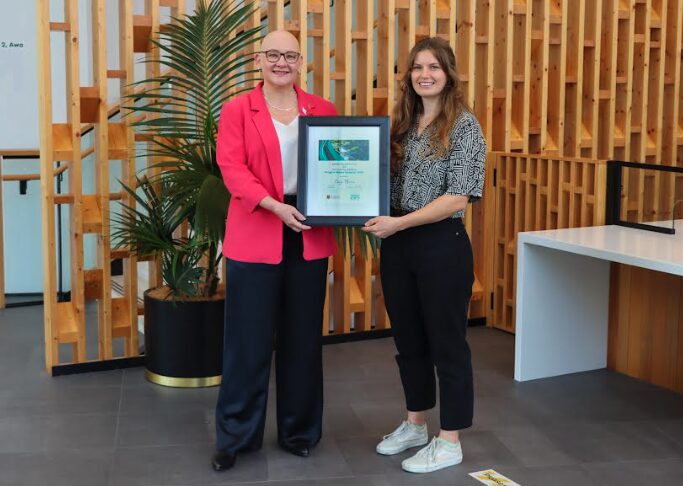Third-year University of Waikato student, Cady Burns, has been awarded the Waikato Regional Council Prize in Water Science for 2024.
Council Chair, Pamela Storey presented the prize, which recognises a student who shows outstanding ability in water science papers taught in the university’s Faculty of Science and Engineering.
“Water is one of our six strategic priorities. We recognise that clean, healthy water is critical for the environment, our freshwater ecosystems and for community health and wellbeing. For us, part of that recognition is encouraging the next generation of water scientists to come forward,” said Cr Storey.
Ms Burns enrolled at the University of Waikato in 2022 to study freshwater ecosystems, looking at both quantity and quality. She will complete her undergraduate study this July and has set her sights on a master’s degree investigating climate impacts around lake systems.
She says her research will focus closely on lakes that have affected communities during previous flood events, especially around hydrology and water quality. She will apply modelling and projection methods to understand the lakes’ dynamics and hopefully shed light on future impacts of climate change.
Ms Burns has combined her study with work at The Wastewater Specialists. Last year, she presented her research findings on the toxicity of different portaloo products at the Water New Zealand Conference. Her study evaluated the impact these types of products used in New Zealand have on the biological systems in wastewater treatment plants.
She says the experience validated her dedication to water science and provided valuable insights for addressing environmental challenges in the field of wastewater management.
Cr Storey says Waikato Regional Council encouraged more students to take up the challenge of studying water and other environmental science.
“I wish it wasn’t such a well-kept secret, but this organisation has a phenomenal team of environmental scientists who are critical for the work we do. We need more in the future,” she said.



